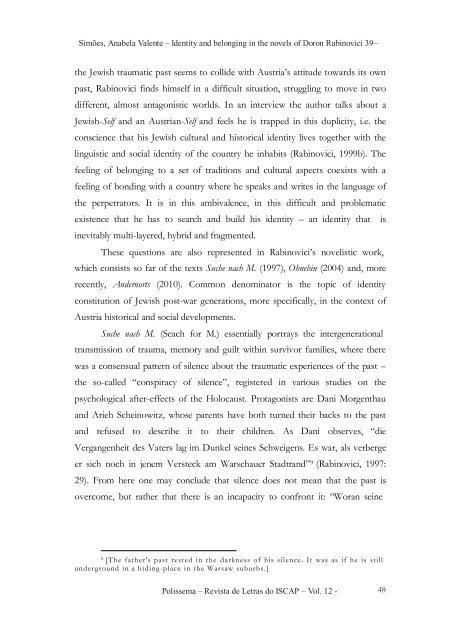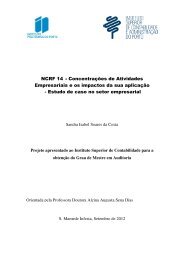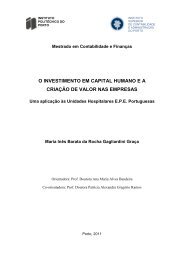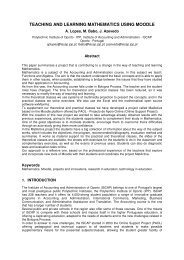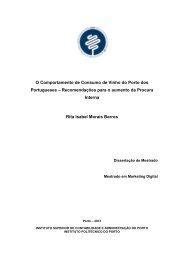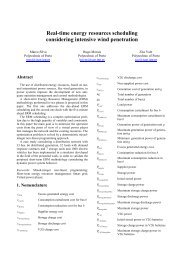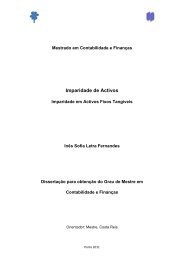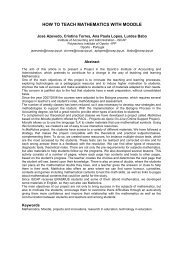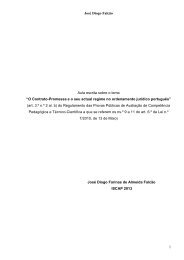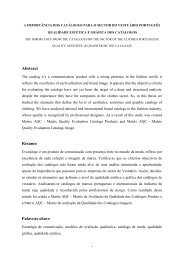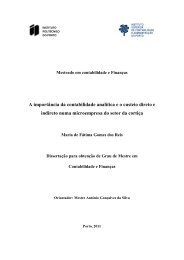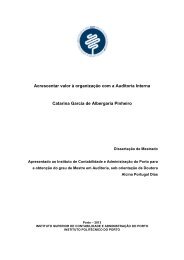- Page 3: PolissemaRevista de Letras do Insti
- Page 6 and 7: DETECTIVES WITH PIMPLES:HOW TEEN NO
- Page 8 and 9: EDITORIALO número 12 da Revista PO
- Page 11 and 12: LÍNGUA ADICIONAL: CONTEXTOS E CONT
- Page 13 and 14: Neves, Ana Cristina - Língua adici
- Page 15 and 16: Neves, Ana Cristina - Língua adici
- Page 17 and 18: Neves, Ana Cristina - Língua adici
- Page 19 and 20: Neves, Ana Cristina - Língua adici
- Page 21 and 22: Neves, Ana Cristina - Língua adici
- Page 23 and 24: Neves, Ana Cristina - Língua adici
- Page 25 and 26: Neves, Ana Cristina - Língua adici
- Page 27 and 28: A língua estrangeiraNeves, Ana Cri
- Page 29 and 30: Neves, Ana Cristina - Língua adici
- Page 31 and 32: Neves, Ana Cristina - Língua adici
- Page 33 and 34: Neves, Ana Cristina - Língua adici
- Page 35 and 36: Neves, Ana Cristina - Língua adici
- Page 37: Neves, Ana Cristina - Língua adici
- Page 40 and 41: Simões, Anabela Valente - Identity
- Page 42 and 43: Simões, Anabela Valente - Identity
- Page 44 and 45: Simões, Anabela Valente - Identity
- Page 46 and 47: Simões, Anabela Valente - Identity
- Page 50 and 51: Simões, Anabela Valente - Identity
- Page 52 and 53: Simões, Anabela Valente - Identity
- Page 54 and 55: Simões, Anabela Valente - Identity
- Page 57 and 58: WORK IN PROGRESS:REPRESENTAR O OUTR
- Page 59 and 60: Cerqueira, Carina - Work in Progres
- Page 61 and 62: Cerqueira, Carina - Work in Progres
- Page 63 and 64: Cerqueira, Carina - Work in Progres
- Page 65 and 66: Cerqueira, Carina - Work in Progres
- Page 67 and 68: Cerqueira, Carina - Work in Progres
- Page 69 and 70: Cerqueira, Carina - Work in Progres
- Page 71 and 72: Cerqueira, Carina - Work in Progres
- Page 73 and 74: Cerqueira, Carina - Work in Progres
- Page 75 and 76: MEMORY AS DISCOURSE IN HAROLD PINTE
- Page 77 and 78: Cerqueira, Carina - Work in Progres
- Page 79 and 80: Cerqueira, Carina - Work in Progres
- Page 81 and 82: Cerqueira, Carina - Work in Progres
- Page 83 and 84: Cerqueira, Carina - Work in Progres
- Page 85 and 86: Cerqueira, Carina - Work in Progres
- Page 87 and 88: Cerqueira, Carina - Work in Progres
- Page 89 and 90: Cerqueira, Carina - Work in Progres
- Page 91 and 92: Cerqueira, Carina - Work in Progres
- Page 93 and 94: Cerqueira, Carina - Work in Progres
- Page 95 and 96: Cerqueira, Carina - Work in Progres
- Page 97: Cerqueira, Carina - Work in Progres
- Page 100 and 101:
Gago, Dora Nunes - Espelhos da pobr
- Page 102 and 103:
Gago, Dora Nunes - Espelhos da pobr
- Page 104 and 105:
Gago, Dora Nunes - Espelhos da pobr
- Page 106 and 107:
Gago, Dora Nunes - Espelhos da pobr
- Page 108 and 109:
Gago, Dora Nunes - Espelhos da pobr
- Page 110 and 111:
Gago, Dora Nunes - Espelhos da pobr
- Page 112 and 113:
Gago, Dora Nunes - Espelhos da pobr
- Page 114 and 115:
Gago, Dora Nunes - Espelhos da pobr
- Page 116 and 117:
Chorão, Graça Bigotte - Resultado
- Page 118 and 119:
Chorão, Graça Bigotte - Resultado
- Page 120 and 121:
Chorão, Graça Bigotte - Resultado
- Page 122 and 123:
Chorão, Graça Bigotte - Resultado
- Page 124 and 125:
Chorão, Graça Bigotte - Resultado
- Page 126 and 127:
Chorão, Graça Bigotte - Resultado
- Page 129 and 130:
ORGULHO E PRECONCEITO 1 : A VISÃO
- Page 131 and 132:
Silva, Ivo Rafael - Orgulho e Preco
- Page 133 and 134:
Silva, Ivo Rafael - Orgulho e Preco
- Page 135 and 136:
Silva, Ivo Rafael - Orgulho e Preco
- Page 137 and 138:
Silva, Ivo Rafael - Orgulho e Preco
- Page 139 and 140:
Silva, Ivo Rafael - Orgulho e Preco
- Page 141 and 142:
Silva, Ivo Rafael - Orgulho e Preco
- Page 143 and 144:
Silva, Ivo Rafael - Orgulho e Preco
- Page 145 and 146:
Silva, Ivo Rafael - Orgulho e Preco
- Page 147 and 148:
Silva, Ivo Rafael - Orgulho e Preco
- Page 149 and 150:
DETECTIVES WITH PIMPLES:HOW TEEN NO
- Page 151 and 152:
Mancelos, João de - Detectives wit
- Page 153 and 154:
Mancelos, João de - Detectives wit
- Page 155 and 156:
Mancelos, João de - Detectives wit
- Page 157 and 158:
Mancelos, João de - Detectives wit
- Page 159 and 160:
Mancelos, João de - Detectives wit
- Page 161 and 162:
Mancelos, João de - Detectives wit
- Page 163 and 164:
Mancelos, João de - Detectives wit
- Page 165:
Mancelos, João de - Detectives wit
- Page 168 and 169:
Almeida, José Domingues de - Le mo
- Page 170 and 171:
Almeida, José Domingues de - Le mo
- Page 172 and 173:
Almeida, José Domingues de - Le mo
- Page 174 and 175:
Almeida, José Domingues de - Le mo
- Page 176 and 177:
Almeida, José Domingues de - Le mo
- Page 178 and 179:
Almeida, José Domingues de - Le mo
- Page 181 and 182:
MIGRACIÓN, PRÁCTICAS ARTÍSTICAS
- Page 183 and 184:
Moner, Laia Manonelles - Migracion,
- Page 185 and 186:
Moner, Laia Manonelles - Migracion,
- Page 187 and 188:
Moner, Laia Manonelles - Migracion,
- Page 189 and 190:
Moner, Laia Manonelles - Migracion,
- Page 191 and 192:
Moner, Laia Manonelles - Migracion,
- Page 193 and 194:
Moner, Laia Manonelles - Migracion,
- Page 195 and 196:
Moner, Laia Manonelles - Migracion,
- Page 197:
Moner, Laia Manonelles - Migracion,
- Page 200 and 201:
Pedrosa, Lúcia - L’hipocrisie da
- Page 202 and 203:
Pedrosa, Lúcia - L’hipocrisie da
- Page 204 and 205:
Pedrosa, Lúcia - L’hipocrisie da
- Page 206 and 207:
Pedrosa, Lúcia - L’hipocrisie da
- Page 209 and 210:
A DINÂMICA COMUNICATIVA DOS SÍTIO
- Page 211 and 212:
Cunha, Maria Clara - Dinâmica comu
- Page 213 and 214:
Cunha, Maria Clara - Dinâmica comu
- Page 215 and 216:
Cunha, Maria Clara - Dinâmica comu
- Page 217 and 218:
Cunha, Maria Clara - Dinâmica comu
- Page 219 and 220:
Cunha, Maria Clara - Dinâmica comu
- Page 221 and 222:
Cunha, Maria Clara - Dinâmica comu
- Page 223 and 224:
Cunha, Maria Clara - Dinâmica comu
- Page 225:
Cunha, Maria Clara - Dinâmica comu
- Page 228 and 229:
Andrade, Nuno Neves - Mundos dentro
- Page 230 and 231:
Andrade, Nuno Neves - Mundos dentro
- Page 232 and 233:
Andrade, Nuno Neves - Mundos dentro
- Page 234 and 235:
Andrade, Nuno Neves - Mundos dentro
- Page 236 and 237:
Andrade, Nuno Neves - Mundos dentro
- Page 238 and 239:
Andrade, Nuno Neves - Mundos dentro
- Page 240 and 241:
Andrade, Nuno Neves - Mundos dentro
- Page 242 and 243:
Andrade, Nuno Neves - Mundos dentro
- Page 244 and 245:
Andrade, Nuno Neves - Mundos dentro
- Page 246 and 247:
Andrade, Nuno Neves - Mundos dentro
- Page 248 and 249:
Andrade, Nuno Neves - Mundos dentro
- Page 252 and 253:
Andrade, Nuno Neves - Mundos dentro
- Page 254 and 255:
Andrade, Nuno Neves - Mundos dentro
- Page 256 and 257:
Frey, Tales - A performance e o des
- Page 258 and 259:
Frey, Tales - A performance e o des
- Page 260 and 261:
Frey, Tales - A performance e o des
- Page 262 and 263:
Frey, Tales - A performance e o des
- Page 264 and 265:
Frey, Tales - A performance e o des
- Page 266 and 267:
Frey, Tales - A performance e o des
- Page 268 and 269:
Frey, Tales - A performance e o des
- Page 270 and 271:
Frey, Tales - A performance e o des
- Page 272 and 273:
Frey, Tales - A performance e o des
- Page 274 and 275:
Frey, Tales - A performance e o des
- Page 277 and 278:
IO (ANCORA) SONO L’AMORE: ALGUMAS
- Page 279 and 280:
Fernandes, Verónica Daminelli - (I
- Page 281 and 282:
Fernandes, Verónica Daminelli - (I
- Page 283 and 284:
Fernandes, Verónica Daminelli - (I
- Page 285 and 286:
Fernandes, Verónica Daminelli - (I
- Page 287 and 288:
Fernandes, Verónica Daminelli - (I
- Page 289 and 290:
Fernandes, Verónica Daminelli - (I
- Page 291 and 292:
Fernandes, Verónica Daminelli - (I
- Page 293:
Fernandes, Verónica Daminelli - (I
- Page 297 and 298:
TRADUÇÃO DE СТАРЫЙ ГЕНИ
- Page 299 and 300:
Kuksenkov, Daniil, Ustimenko, Maria
- Page 301 and 302:
Kuksenkov, Daniil, Ustimenko, Maria
- Page 303 and 304:
Kuksenkov, Daniil, Ustimenko, Maria
- Page 305 and 306:
Kuksenkov, Daniil, Ustimenko, Maria
- Page 307:
Kuksenkov, Daniil, Ustimenko, Maria
- Page 311 and 312:
LITERARY TEXTS AND INTERCULTURAL LE
- Page 313 and 314:
Cerqueira, Carina - Literary texts
- Page 315 and 316:
OS BUDDENBROOK 1 , DE THOMAS MANNMi
- Page 317 and 318:
POLISSEMANORMAS DE APRESENTAÇÃONO
- Page 319 and 320:
POLISSEMAGUIDELINES FOR CONTRIBUTOR


